I Medici is an Italian-British period drama following the rise to power of the Medici family. You might have heard of it under the names Medici: Masters of Florence and Medici: The Magnificent. These are the names of the two seasons. Indeed, according to what channel is broadcasting it, I Medici is presented differently.
The show focuses on political intrigues and banking stunts while, in the background, the Italian renaissance is starting to unfold. In term of plot and characters I Medici is very high quality. Created by TV-veterans such as Frank Spotnitz (known for X-files), it stars both settled international stars (Dustin Hoffman, Sean Bean), rising international actors (Richard Madden) and Italian actors. It also benefits from being filmed in Italy which makes the scenes and their environment ring true. Frankly this show was made with care and talent and it shows.
Both seasons focuses on two charismatic patriarchs of the family: Cosimo de Medici (Pater Patriae) and Lorenzo de Medici (the Magnificent). So yeah I Medici is firstly a story of men. I have the impression the show suffers from the 25% of female character against 75% of male one. That’s not a great look. Yet I really like what I Medici does with its too few female characters.
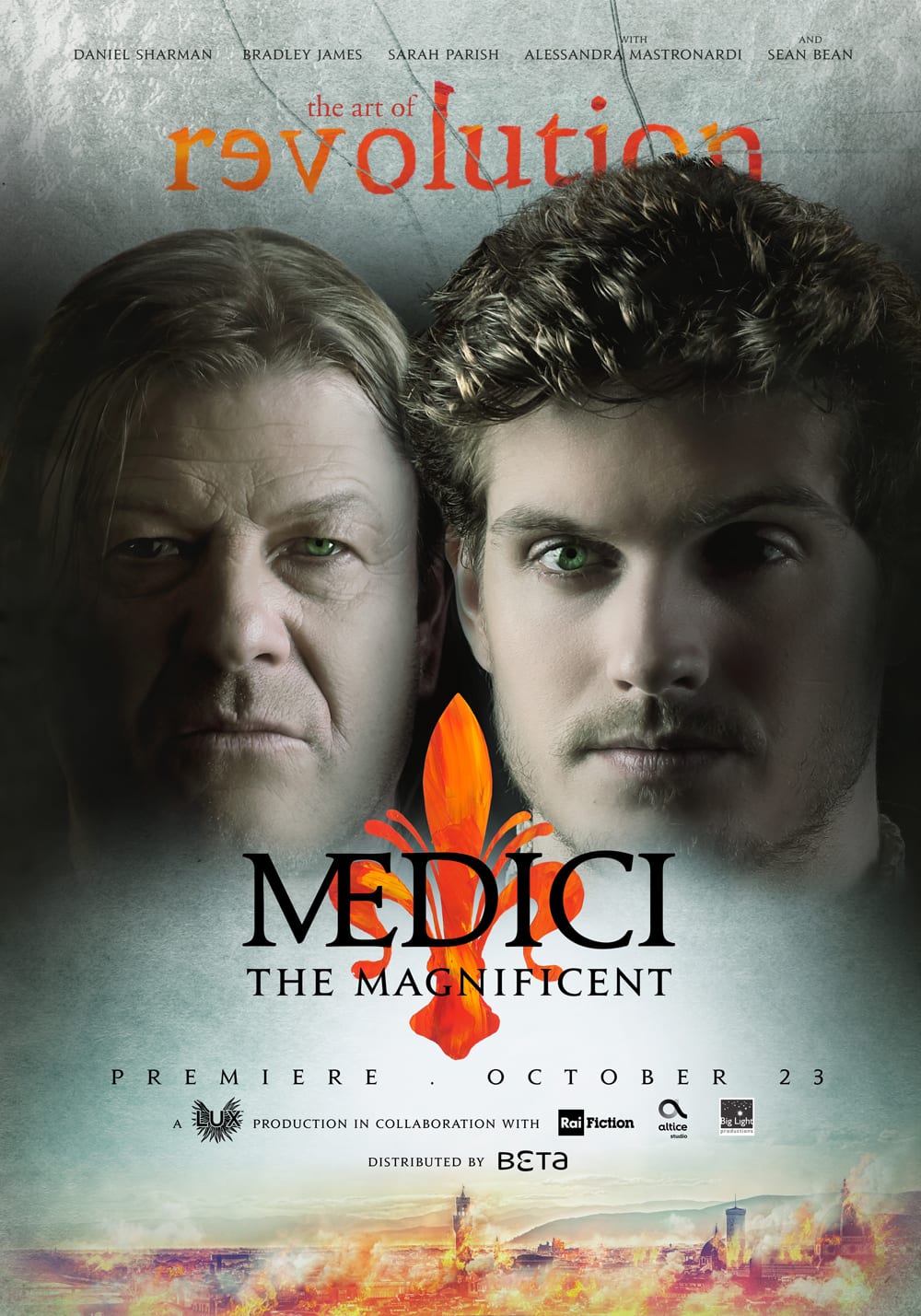
Taking liberties with history:
As with all period dramas, I Medici takes liberties (sometimes big, sometimes small) with history. While I have my issues with historical productions changing historical facts, I get why it’s done. People’s motivation are sometimes unclear. Events are missing. People disappear from historical records for several years etc. So making a story thematically coherent and clear for the watcher will require some historical betrayals.
Yes, storytellers must make decisions and these decisions won’t be to everyone’s taste. I personally draw the line at turning historical people into two dimensional caricatures, forgetting to take into account the historical context and the mentalities that come with it, and telling a story that barely resembles the actual historical events because the writers thought the idea was cool but the reality boring. Otherwise I have my nitpicks but I am pretty lenient. After all, historical fiction is fiction and cannot be held at the same standard as academia.
I Medici passes my criteria. However, keep in mind that, even as an history buff, Italian Renaissance is absolutely not my era of expertise. Still the show does not aims at absolute historical accuracy. Indeed, the creators had this to say about season 1:
“the season will be more thriller than historical saga”
So let’s see what kind of historical inaccuracies I Medici presents. And how it impact its female characters.
Changes to ease the narration:
It is evident that I Medici wants to be high in tension and drama. So when there are dark areas for which historical knowledge is scarce the show will choose the way which increases tension. That’s for example the case of Giovanni de Medici’ assassination. Cosimo spends season 1 trying to find the truth about his father’s death and it increases his distrust of other characters. But since the info of Giovanni’s death is being kept secret by the Medicis it can still work with the historical fact that there is no mention of anyone murdering Giovanni.
Not all events can be tied back to history though. One of Cosimo and Contessina’s sons is missing. As a general rule there is way less Medicis running around than in history. For example in the show Cosimo’s brother has no children. A lot of people are assassinated when they actually weren’t. Some characters do things that their historical counterparts did not do etc.
The point here is twofold. First, there is what we already saw with Giovanni is to heighten tension and drama. I Medici is a political thriller full of backstabbing and butts of courage. It needed to feature more deadly twists and turns and situations in which one faux-pas sends you into the abyss. The second reason is to make things easier to understand. If we take for example Cosimo and Contessina’s missing son (Giovanni) it happens that this son, who was supposed to inherit his father’s place died several years before his dad. Meaning all intrigue surrounding him will have had no impact on season 2 taking place two generations after Cosimo.
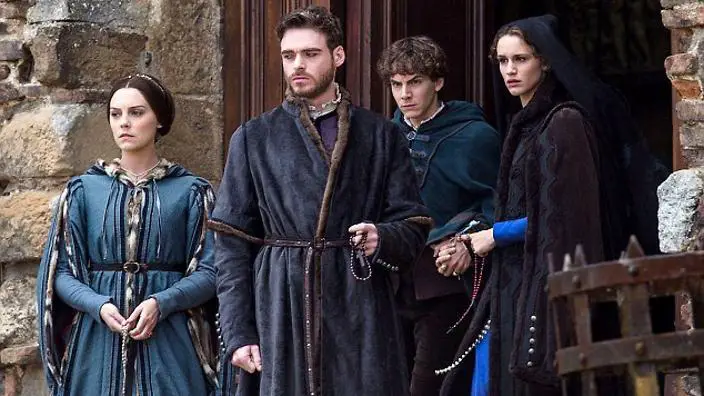
The presence of Giovanni could have lead to an interesting plot line during season 1, but considering that Medici: Masters of Florence covers several years in 8 episodes of 52min choices needed to be made. Too many plotlines would have lead to incomprehension and poor execution, for lack of time (there is a reason why the rule of the three unities existed in classical theater).
Costuming:
Hello, this is me nitpicking but I have my issues with I Medici’s costumes. They are by no means universe breaking. They fit and they are pretty enough. There is an “end-of medieval beginning of renaissance” vibe to them. But they are not historical. The long floating hair on women keeps on bothering me. Yes it was even on married women! They are styled enough to not be in their face all the time, and there is the occasional veil here and there but still. It is a very modern look and for someone like me who love headpieces it look like someone wanted to antagonize me personally.
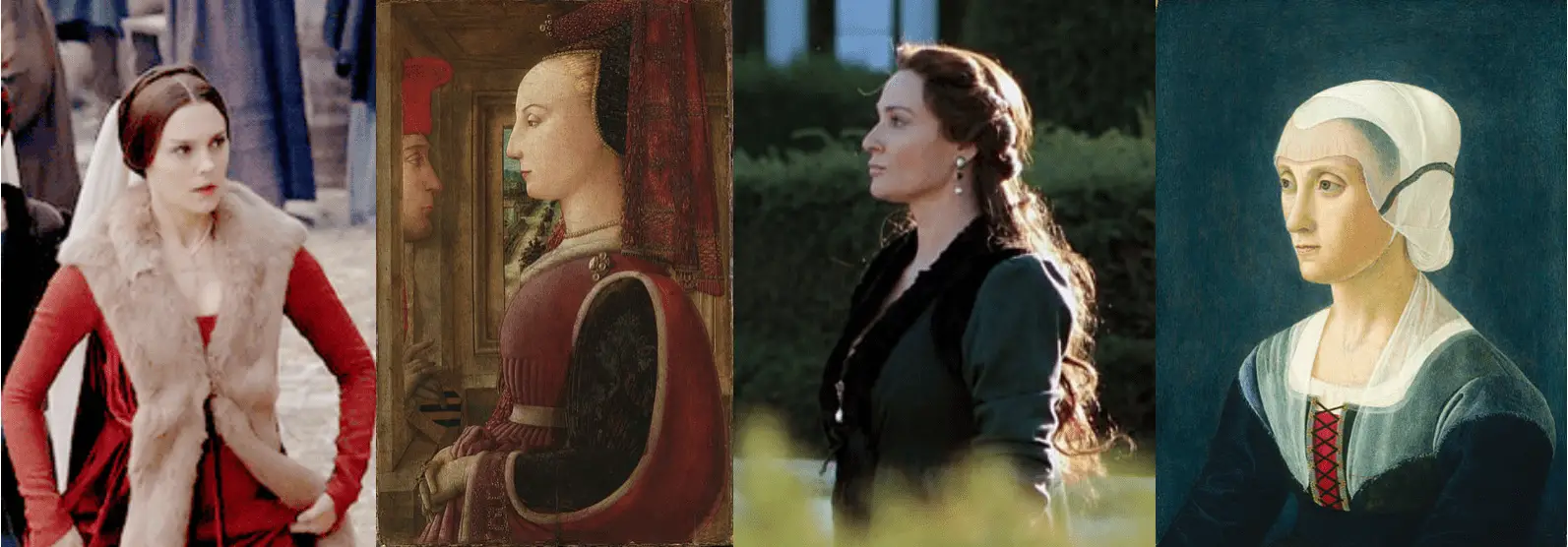
So if you are a fan of historical costumes and Italian Renaissance fashion you might cry bitter tears while watching I Medici. There is however excellent scenes composition in season 2 that are supposed to have inspired Botticelli’s paintings. So if you like art very much you might appreciate this. But you will probably be busy ignoring the paintings that should not be there too.
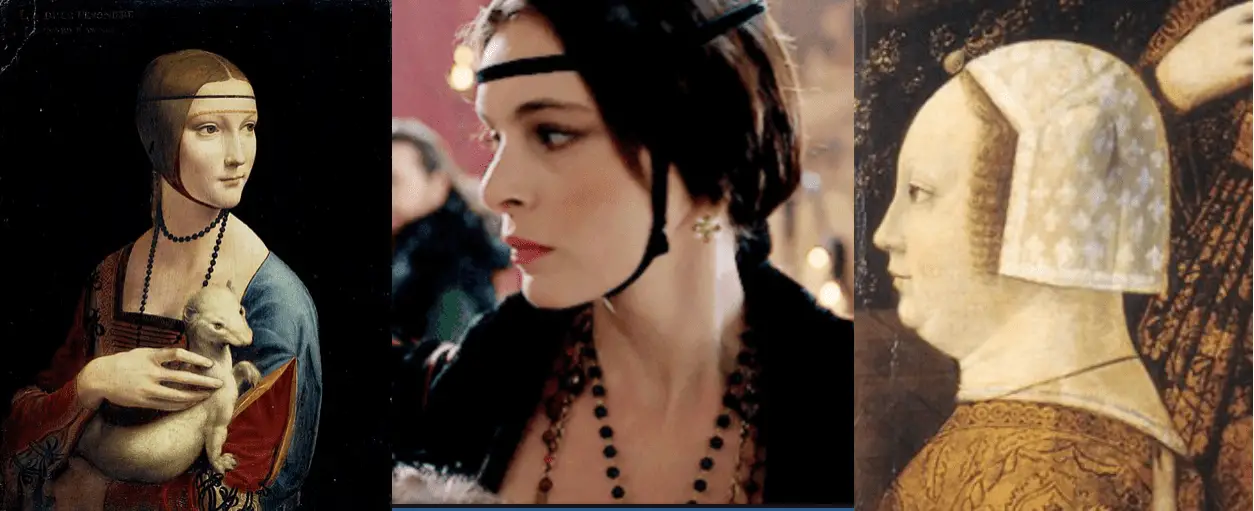
Dark areas and creative decisions:
Individuals in history tend to be quite obscure. Except if they had a tremendous impact on the world, we know the “great lines” of their life, but there is a lot missing. This is especially true for women, whose place in society, while fundamental, often prevented them to directly take action so world changing that entire chronicles would be written about them. So creators must fill in the blanks. Unfortunately when writer start to take liberty with history to further their theme/intrigue women tend to get the short end of the stick.
We can see it in the portrayal of Katherine Howard in The Tudors which followed all the nastiest slander about her. Natalie Dormer also had to fight to present a closer to reality portrayal of Anne Boleyn in the same show. In Knightfall, Queen Joan of Navarre was turned into a cheating wife. She resents her union and her husband, Philip IV of France, would be lost without her (LOL). (If you are wondering why this offends me so much it is because the idea of the actual Philip IV of France being lost and not the most cunning, coldest monarch in medieval France is propertruous. The freaking Iron King! Also historical facts tend to prove a quite close and maybe even loving relationship with his wife…) And we will not open the can of worms that the Frost/Gregory cinematic universe is.
Historical licence with obscure historical women often mean that their sexe life will be spiced up, their morality loosen, their mentality quite alien for their era, and their male relatives dumbed down. Well I am pleased to announced that this isn’t the road taken by I Medici. Sure the female characters sometimes do things that their historical counterpart haven’t done (we would know it if Contessina had entered the priori on horseback) but it still works.
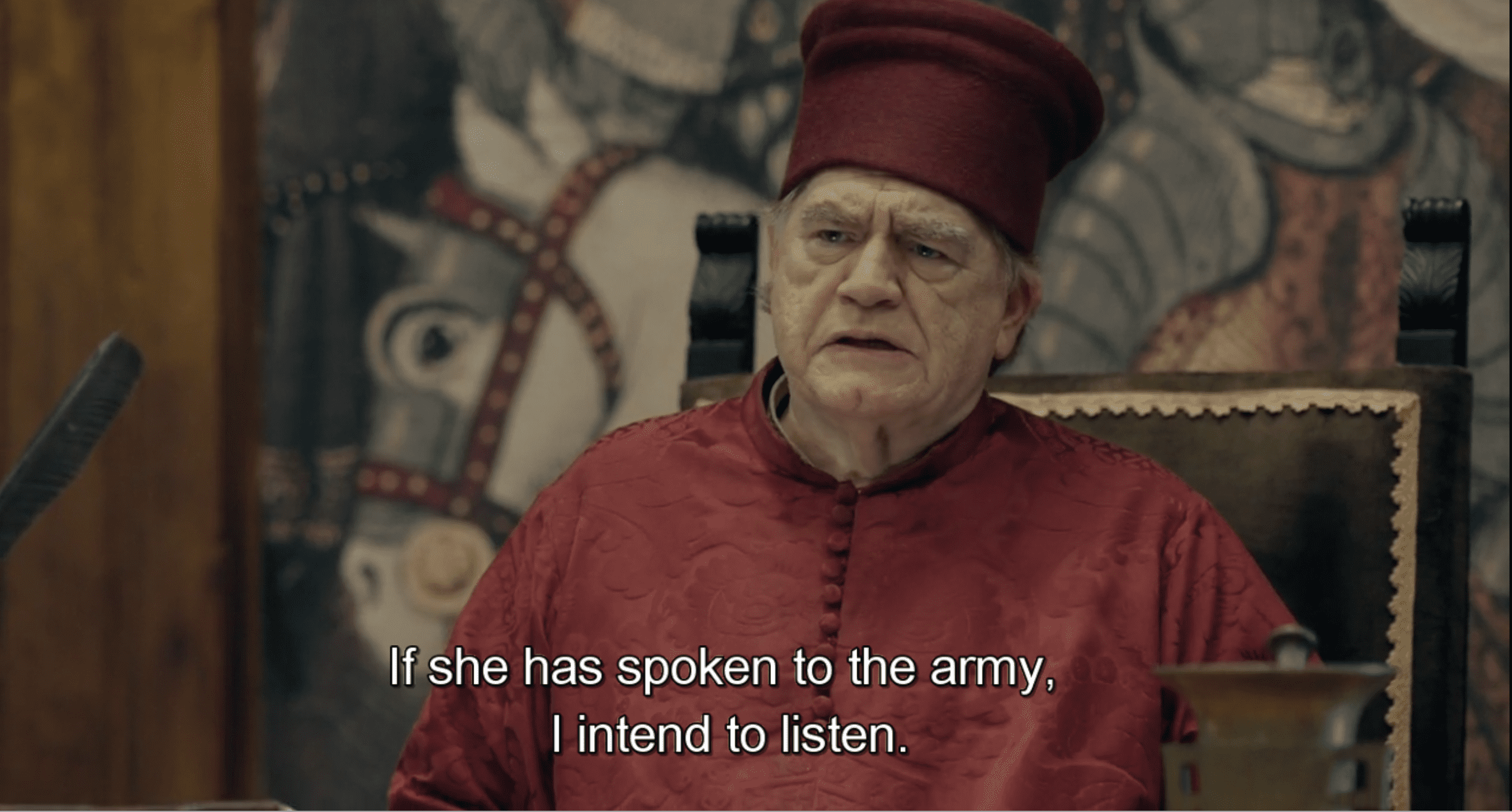
Because the show develops female characters that first and foremost make the world goes round when their male relatives are revolutionizing it.
Women’s action:
For me, that’s the value of I Medici’s portrayal of its female characters. The idea that they were here and that they were indispensable without ever having to portray male characters as blatantly stupid.
I Medici presents women with agency:
Women in I Medici do a lot of things. They are really pro-active especially older women (in here read women whose children are themselves having children). First they advise the men in their life. It might sound a bit underwhelming but having women being presented as reasonable, reliable, and faithful isn’t that commun. Especially when the show really want you to think that the men they are counseling are super smart.
In addition this help they provide isn’t monitored or directed by men. They are entrusted to make their own decision, face hard situation on their own, and are often de-facto in charge when men are not here (this is especially true for Contessina). The women of the Medici family are also without a doubt as hellbent on the success of the family as their male counterparts.
That’s why they have a proactive role that goes beyond giving good idea to someone. Contessina deals with the robbers/rioters on her own in season 1. She makes them leave without having soldiers to order around. In season 2, Lucrezia thinks and organizes the match that will save the bank on her own. Clarice quick thinking saves her husband life in the Duomo. Contessina rides a horse into the priori to save her husband, not only because she loves him but also mainly because she thinks the Medici family will not survive his untimely death.
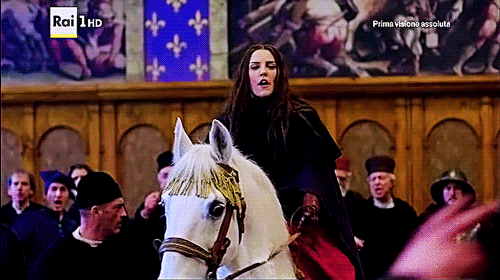
And while yes this leads I Medici to give some “un-feminine” actions “packed” scene to its female character it is never world shattering. Nothing goes beyond the capacity of a skilled horsewoman. In addition, the show is full of “surprisingly” positive female relationships. Contessina mentors Lucrezia (de Medici, Lorenzo’s mom) falling away from the wife/mother-in-law rivalry. Clarice and Lucrezia (Donati not Lorenzo’s mom but his mistress) forms a respectful and somehow trustful relationship despite being both romantically interested in Lorenzo etc.
Without forgetting to take the context into account:
But still this women, as incredible they are, are humans and live in a patriarchal system different (but not unrelated) to ours. They don’t always make the right decision, logically or morally speaking. They don’t all get along and they have their jealousy. Most notably Contessina takes very badly that Cosimo brings back Madeleine (a slave and his mistress) with him in their home. While she does criticizes Cosimo she is harsher with Madeleine because she has more power on her. That’s one of Contessina flawed actions but it still makes sense. A different example is Simoneta worrying about what her husband could do to her if her extra-marital affair was discovered.
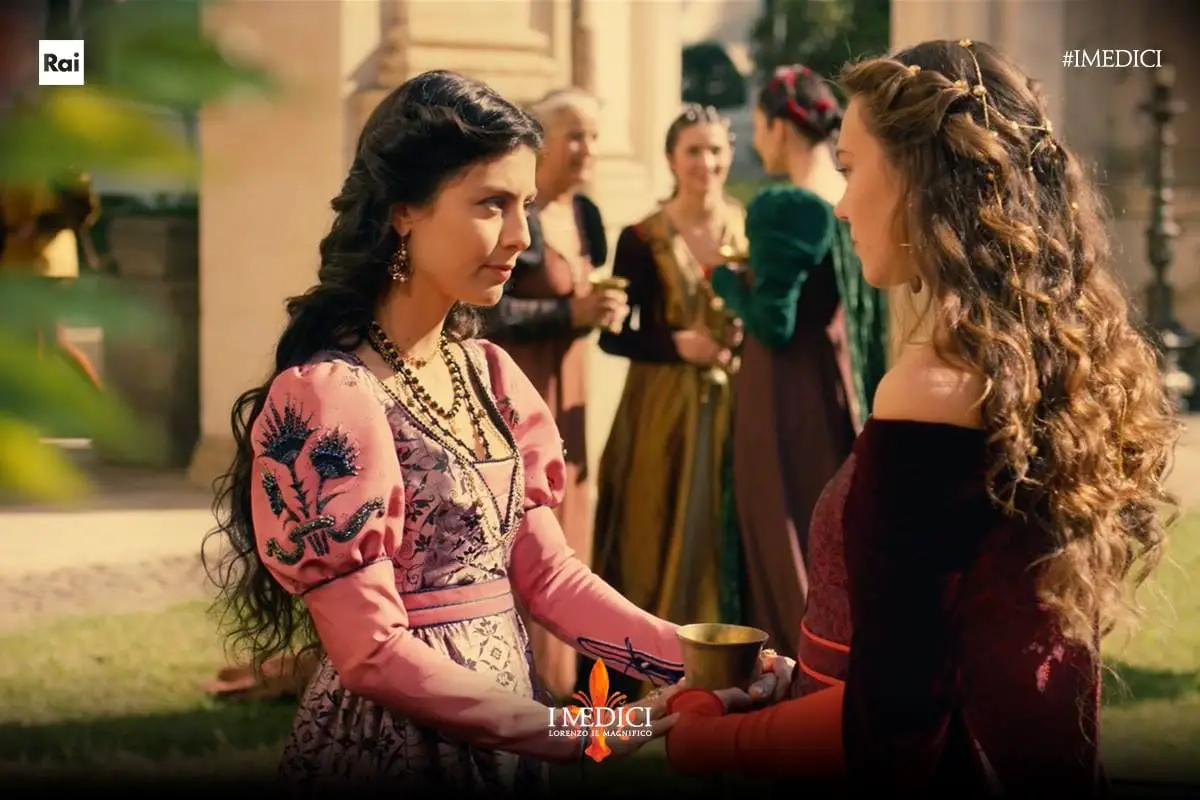
Generally the I Medici women focus a lot on marriage and children. While it might be a bit alienating for a modern audience it is quite true to the era. As women, the kind of marriage they entered ended up shaping the rest of their life. Similarly they were expected to produce children, boys preferably, if they were marrying the head of a family.
In short the I Medici women are active players in their own lives and for their family but still have to navigate a context which isn’t favorable to their gender. I personally find that the show deals with this paradox quite well. For me I Medici follows the spirit of one of its own quotes. In season 1, Contessina tells this to Lucrezia:
“There are more ways for a woman to be indispensable than just bearing children.”
While this overwise interesting article about the historical inaccuracies of season 1 says this “smacks of the 21st century” I will have to disagree. For me this quote represent the position of women in I Medici. Sure they are expected to perform their gendered “duty” but they can and will be so much more than that. Each woman will be her own person according to her convictions and desires. They won’t always be strong but they won’t be automatically weak or passive either. Isn’t this what writing strong female characters is about?
Conclusion:
Both season of I Medici are really good. Even if you are not particularly sensitive to the writing of female characters there is a good chance that you will like it. Especially if you like political drama or period drama. In the meantime I am really happy that apparently the show recognized that their female characters are a strength. Indeed Contessina had several apparitions in season 2. Her husband Cosimo, the protagonist of season 1, (who did die 9 years before her) did not even get a glorified death scene.
All images courtesy of Netflix.

